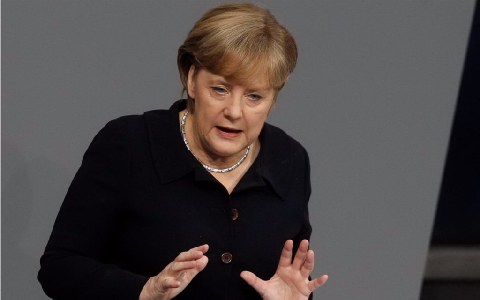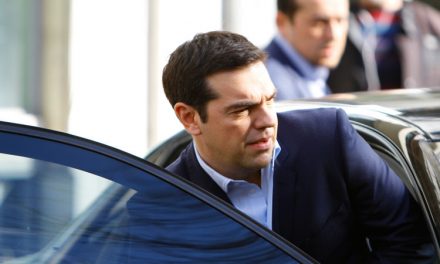By ALISON SMALE, New York Times
Chancellor Angela Merkel of Germany on Sunday called for the swift start of negotiations on the Greece bailout package, reiterating her insistence that there will be no reduction in Greek debt but saying that other relief measures can be discussed once Greece has been stabilized.
“There are 11 million people in Greece,” Ms. Merkel told the ARD public service broadcaster in an interview, and, while banks are set to reopen Monday, “there is no normal life,” she said.
That is why, she said, “we should start negotiating quickly.”
Ms. Merkel’s remarks, made before going on her annual summer vacation, followed weeks of tensions between Greece and Germany over the terms of a bailout to prevent the collapse of Greece’s banks and preserve its membership in the eurozone.
The German government has held a hard line in the European talks, and its finance minister, Wolfgang Schäuble, shocked many last week by suggesting that Greece might be better off if it left the eurozone, at least temporarily.
Clearly seeking to put acrimony behind her, Ms. Merkel refused to be drawn into discussing political rifts in her government or with Germany’s partners. Instead, she insisted that talks must now proceed swiftly.
She said it would be possible to talk about altering the maturities of Greece’s debt or reducing interest paid by Athens, but only after the first successful review of the bailout package, worth up to 86 billion euros, about $93 billion, which must now be negotiated.
The chancellor once again ruled out what she called a “classic haircut,” by which she meant sharply reducing or forgiving the country’s debt.
“A classic haircut of 30, 40 percent of debt cannot happen in a currency union,” she said.
She noted that a voluntary haircut among private creditors already occurred in 2012 and that maturities had also been extended and interest rates reduced in the past.
“And we can now talk about such possibilities again,” she said, “once the first successful review of the program to be negotiated has been completed. Then exactly this question will be discussed — not now, but then.”
In the 20-minute interview, Ms. Merkel seemed determined to draw a line under the rifts revealed within her government and in Europe over the past weeks of turmoil.
She made it clear that she hoped the bitterness would now subside.
Ms. Merkel declined, for instance, to go into detail on Mr. Schäuble’s remarks last weekend suggesting that Greece leave the eurozone.
He repeated the suggestion again on Thursday, a day before the German Parliament gave its crucial approval to talks on a third Greek bailout.
“We have a common result” with Parliament’s backing, Ms. Merkel said, “and the finance minister will conduct these negotiations, just like I will.”
On Saturday, Mr. Schäuble again caused ructions when the weekly Der Spiegel published an interview with him in which he indicated he would be prepared to resign rather than abandon his convictions.
Ms. Merkel waved off a question about the remarks, saying only: “Nobody has come to see me and ask for some kind of dismissal. And I have no intention of continuing this discussion.”
Asked what would happen if Greece’s prime minister, Alexis Tsipras, did not deliver on promised structural reforms, Ms. Merkel again brushed the question aside: “I’m not going to speculate two days after the vote. We will negotiate now.”
After the marathon negotiations in Brussels and in individual members of the 19-nation eurozone, “what counts now is what the result of these discussions was,” she said, which was agreement to try to negotiate a new bailout.
“That must now be put into action.”



















